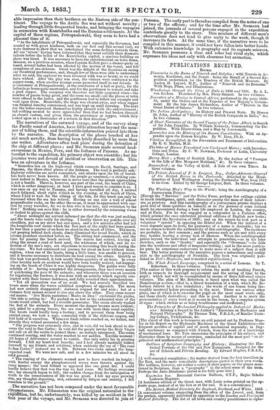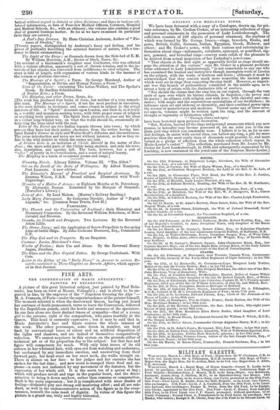PUBLICATIONS RECEIVED.
Boom.
Discoveries in the Ruins of Nineveh and Babylon ; with Travels in Ar- menia, Kurdistan, and the Desert : being the Result of a Second Ex- pedition undertaken for the Trustees of the British Museum. By Austen II. Layard, M.P., Author of "Nineveh and its Remains." With Maps, Plans, and Illustrations.
Wanderings through the Cities of Italy in 1850 and 18,51. By A. L. von Rochau. Translated by Mrs. Percy Sinnett. In two volumes.
Narrative 0/a Mission to Central Africa, performed in the years 1850- 51, under the Orders and at the Expense of her Majesty's Govern- ment. By the late James Richardson, Author of "Travels in the Great Desert of Sahara." In two volumes.
The Indian Archipelago ; its History and Present State. By Horace St. John, Author of "History of the British Conquests in India," &c. In two volumes.
A Short Narrative Of the Second Voyage of the Prince Albert, in Search of Sir John Franklin. By William Kennedy, Commanding the Ex- pedition. With Illustrations, and a Map by Arrowsmith.
Researches into the History of the Roman Constitution. With an Ap- pendix upon the Roman Knights. By W. Dine, Ph.D.
Vitalism Exemplified, in the Prevention and Treatment of Deformities. By E. G. Martin, M.D.
The Odes of Horace Translated into Unrhymed Metres ; with Introduc- tions and Notes. By F. W. Newman, Professor of Latin, University College, London.
Harry Muir ; a Story of Scottish Life. By the Author of "Passages in the Life of Mrs. Margaret Maitland," &c. In three volumes. Bannmford ; or the Valley of Gold. A Tale of our own Times. In three volumes.
The Private Journal of F. S. .Larpent, Judge-Advocate-General of the British Forces in the Peninsula. Attached to the Head- Quarters of Lord Wellington during the Peninsular War, from 1812 to its close. Edited by Sir George Larpent, Bart. In three volumes.
The Working Manes Way in the World; being the Autobiography of a Journeyman Printer. [Except the Services" and the Police Force, perhaps few callings exhibit so much intelligence, spirit, and character among the mass of their follow- ers, as printers. And this autobiography of a journeyman printer displays a good deal of those qualities in himself, or in the in of some natural mark he encountered during a busy life employed London, the country,
and at Paris. For he was engaged as a compositor in a Parisian office, which printed the once celebrated piratical editions of English new books; he witnessed the Revolution of 1830; and on his return he took part as a volunteer " special " in opposing the Bristol riot. When the interest of a work depends upon its facts, the guarantee of a name is desirable ; but we see no reason to doubt the authenticity of this autobiography. The incidents are probable, in fact common ; and the persons such as are met with every- day, besides bearing a strong look of likeness. When the autobiographer passes beyond the individual and attempts to generalize,—as in his later sketches, such as the "Reader," and especially the "Overseer,"—he falls into the wordiness and effort of magazine-writing ; and in the more particu- lar parts he sometimes endeavours to make more of a subject than it will bear. The better portions of the narrative possess a naturalness and reality akin to the autobiography of Franklin. The book was originally pub- lished in Tait's Magazine, and it merited republication.]
The Whole French Language, comprised in a series of Lessons. By T. Robertson. In three volumes. Volume I.
[The author of this work proposes to reform the mode of teaching French, both as respects its thorough acquirement and the saving of time by the pupil ; which last will be accomplished by means of three full-sized octavo volumes. The plan of Mr. Robertson is based upon what was called the Hamiltonian system,—.that is, a literal translation of a text, which Mr. Ro- bertson follows by a free translation ; the words of one lesson being tho- roughly mastered -before proceeding to the next. There are various other plans, one of which is to exercise the pupil on the most usual words only, and those chiefly derivatives: and this is good. Another is to mark the pronunciation of every word as it occurs in the lesson, by a complex system of signs : 'which strikes us as being troublesome and inefficient.]
The Principles of Mechanical Philosophy applied to Industrial illicha- nics forming a Sequel to the Author's "Exercises on Mechanics and Natural Philosophy." By Thomas Tate, F.R.A.S., of Midler Train- ing College, Twickenham, &c.
[The object of this work is to remove an evil pointed out by Professor Mose- ley in his Report on the Hydraulic Machines of the Great Exhibition—the frequent sacrifice of capital and of much mechanical ingenuity, in Eng- lish machinery as compared with French, from the want of a knowledge of mechanical laws. Mr. Tate enunciates the principles of his subject, and illustrates them by means of exercises, conducted for the most part "on al- gebraical and mathematical principles."]
Outlines of Scripture Geography and History; illustrating the His- torical Portions of the Old and New Testaments. Designed for the use of Schools and Private Reading. By Edward Hughes, F.R.A.S., &c.
[A well-executed compilation ; the matter derived from the best travellers in the East, and the more remarkable descriptions quoted in their own words.
The outlines, however, are rather a series of short papers on the places men- tioned in Scripture, than a "geography" in the school sense of the term. Perhaps the Ante-Abrahamic period is too fully gone into.] EuporLaou be. Reeensuit Carolus Badham, S.T.P., Regis° Scholar Ludensis Magister. [A handsome edition of the Greek text, with Latin notes printed on the op- posite page, instead of at the foot or at the end. It is a convenience.] The British Medical _Directory for England, Scotland, and Wales. 185a . [A convenient volume, emanating from the office of the Lancet, and, from the preface, apparently published in opposition to the London and Provincial Medical Directory. The list of all town and country practitioners is alpha-
belled without regard to district or other divisions; and there is various col- lateral information, as lists of Poor-law Medical Officers, Coroners, Hospital and Medical Schools, &c., with an obituary ; the volume also contains a good deal of general business matter. So far as we have examined its particular facts they are correct.]
A Poet's Day Dreams. By Hans Christian Andersen, Author of "Pic- tures of Sweden," &c.
[Twenty papers, distinguished by Andersen's fancy and feeling, and his power of poetically describing the external features of nature, with a ten- dency to literal enumeration.]
The Light of the Forge; or Counsels drawn from the Sick-bed of E. M. By William Harrison, A.11., Rector of Birch, Fagex, &c.
(An account of a blacksmith's daughter near Cokhester, who was afflicted with a violent affection, apparently a sort of chronic tetanus, and in the in- tervals of her attacks was converted from indifference to vital religion. The story is told at length, with expansions of various kinds in the manner of the sermon or platform discourse.]
The Musings of a Spirit ; a Poem. By George Marsland, Author of "Regeneration, or Divine and Human Nature, a Poem." Tales of the Forest : containing The Lotus-Walker, and The Spoiler's Doom. By Snellius Schickhardus.
_4 Broken Echo; a Poem.
The Holyday, and other Poems, Songs, &c. fThe week has produced four books of verse, but neither of a very remark- able kind. The Musings of a Spirit, if not the most poetical in execution, is the most definite in structure, and comes closest in subject to the actual interests of life. A "Spirit" descends upon London, and finds it, as it really is, a worldly and mammon-seeking town, with little proper sense of religion or anything truly spiritual. The Spirit then proceeds to pour out his ideas in a rather long-winded way., on what the world should be, occasionally al- ternating the beau ideal with the real.
Tales of the Forest are two Indian legends thrown into verse ; by which process they have lost their native character, from the writer having imi- tated Byron's G-iaour in style and Walter Scott's diffusion and discursiveness. The prose introduction and notes are not without interest, so far as they re- late to the wild district in which the scenes are laid.
A Broken Echo is an imitation of Childe Harold in the metre of Don Juan; the more solid parts of the Child° being omitted, and only his reve- ries, description, and egotism left. The book, however, has a sort of " echo " of poetry in it—versification, and a sense of natural beauty. The Holyday is a batch of occasional poems and songs.] Warerky Novels. Library Edition. Volume XL "The Abbot."
Ode on the Death of the Duke of Wellington. By Alfred Tennyson, Poet Laureate. A new edition.
The Dissector's Manual of Practical and Surgical Anatomy. By Erasmus Wilson, F.R.S. Second edition. Illustrated with Wood- Engravings.
Memoirs of a Maitre d' Armes ; or Eighteen Months at St. Petersburg. By Alexandre Dumas. Translated by the Marquis of Ormonde. (Traveller's Library.) Joan of Arm By Lord Mahon. (Murray's Railway Reading.) Lady Mary _Pierrepoint. By Catherine Sinclair, Author of "Popish Legends," &c. (Common Sense Tracts, Part H.)
PAMPHLETS.
The Church and the Universities of Scotland ; their Historical and Necesssary Connexion. By the Reverend William Robertson, of Mon- zievaird. and Strowan.
Canada, its Growth and Prospects. Two Lectures. By the Reverend Adam Lillie.
The Steam Navy; and the Application of Screw-Propellers to Sea-going Line-of-battle Ships. By John Cochrane Hoseason, Esq., Commander R.N.
The Flag List and its _Prospects. By an Enquirer. Customs : Lucien Marchand's Case.
Works of Fiction; their Use and Abuse. By the Reverend Henry Angus, Aberdeen.
The Glass and the New Crystal Palace. By George Cruilrshank. With Cuts.
Letter to the Editor of the "Daily News," in Answer to certain _Re- marks contained in Three Chapters on Baroda Affairs, which appear- ed in that Journal.

























 Previous page
Previous page